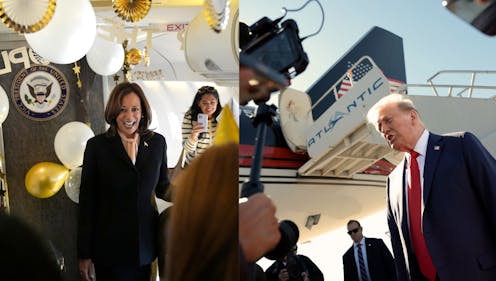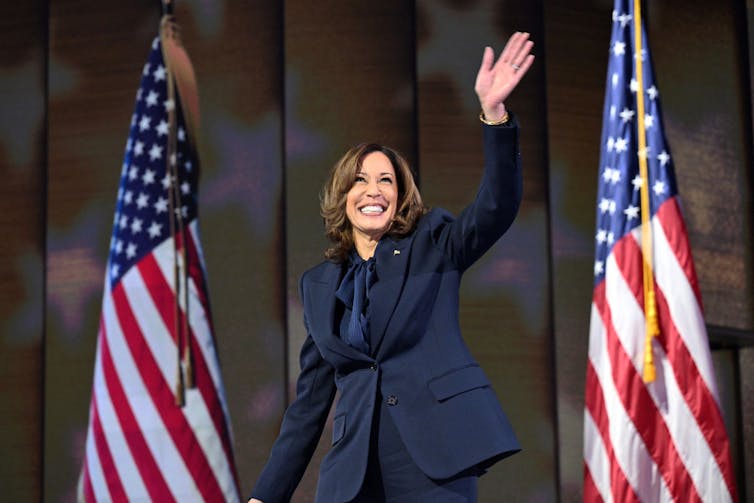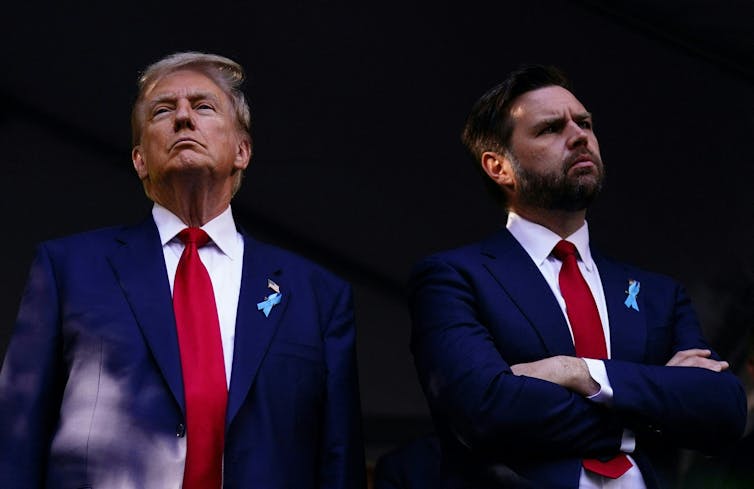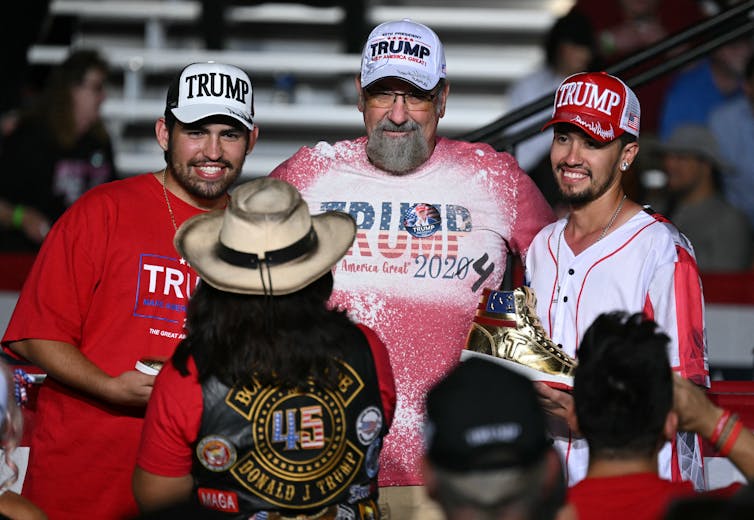What’s in a pantsuit? Kamala Harris’ and Donald Trump’s fashion choices say a lot about their personalities − and vision for the future
- Written by Therèsa M. Winge, Fashion Professor, Michigan State University
 Kamala Harris and Donald Trump have very different policy positions and political approaches − as well as fashion choices. Jacquelyn Martin/pool/AFP via Getty Images and Win McNamee/Getty Images
Kamala Harris and Donald Trump have very different policy positions and political approaches − as well as fashion choices. Jacquelyn Martin/pool/AFP via Getty Images and Win McNamee/Getty ImagesDemocratic presidential nominee Kamala Harris and Republican contender Donald Trump could not be more different – and this split between them extends far beyond politics and into their fashion choices.
While Harris tends to wear form-fitting pantsuits and feminine tops, Trump opts for ill-fitting, boxy, navy suits and long red ties.
All American politicians oftenwear American flag pins on their lapels, as well as red, white and blue clothing. But my research shows how fashion plays an important, symbolic role in politics that goes far beyond patriotism. A person’s appearance reflects their identity and how they want others to perceive them.
It makes sense that political campaigns often work with professional stylists to dress and style their top candidates, as a way to define and reflect politicians’ different personalities, identities and policy positions.
 Kamala Harris arrives to speak at the Democratic National Convention on Aug. 22, 2024, wearing a dark blue pantsuit.Saul Loeb/AFP via Getty Images
Kamala Harris arrives to speak at the Democratic National Convention on Aug. 22, 2024, wearing a dark blue pantsuit.Saul Loeb/AFP via Getty ImagesHarris’ professional, feminine look
Harris typically wears an updated version of Hillary Clinton’s famous power pantsuits.
While Clinton’s pantsuits during the 2016 presidential campaign had rigid silhouettes that did not show the shape of her body, Harris’ pantsuits are more relaxed and less formal.
As a senator, Harris, alongside other Democratic female politicians, wore a white pantsuit to commemorate and celebrate the suffragettes.
Harris now typically wears dark, bold hues, almost monochromatic ensembles, with either dark high heels or sneakers.
At the Democratic National Convention in August 2024, Harris accepted the presidential nomination wearing a perhaps unsurprising navy blue pantsuit with the standard politician’s American flag pin on the lapel. She topped off the look with medium-heel dress shoes and a dark blue pussycat bow blouse, sometimes also called a lavallière. The pussycat bow blouse, which was popularized in the 1970s among professional women, is a feminine version of a traditional tie.
This type of tie has a soft, floppy bow at the neck that can be tied in numerous ways.
Harris’ decision to regularly wear pussycat bow blouses shows that she has a feminine flair, and it’s also a nod to past feminist icons who wore that type of bow.
When Harris wears sneakers – which are often Chuck Taylors – with a pantsuit, it reminds me of how the actress Helen Hunt’s character wore practical commuter sneakers with business clothing in the 1990s and 2000s “Mad About You” TV series.
The unlikely combination of a pantsuit with sneakers shows that Harris is a busy, professional woman – who is also youthful, energetic and relatable to other women.
Walz’s American dad style
 Tim Walz speaks at a campaign rally in Volant, Pa., on Oct. 15, 2024, wearing one of his signature flannel shirts.Michael M. Santiago/Getty Images
Tim Walz speaks at a campaign rally in Volant, Pa., on Oct. 15, 2024, wearing one of his signature flannel shirts.Michael M. Santiago/Getty ImagesHarris’ running mate, Tim Walz, has also received public attention for his clothing choices.
At the Democratic National Convention in August, former President Barack Obama remarked about Walz regularly wearing plaid, flannel shirts. “You can tell those flannel shirts he wears don’t come from some political consultant. They come from his closet, and they have been through some stuff,” Obama said.
Walz’s typical outfits, including plaid shirts, jeans and a well-worn suit with the shirt collar unbuttoned and no tie, signals that he is authentic and relatable to the average American.
This unofficial uniform also helps cement the public perception of Walz as an archetypal American coach and dad.
The Harris-Walz campaign has capitalized on Walz’s image by selling merchandise that seems like something out of his closet.
The campaign’s camouflage hat, which spells out “HARRIS WALZ” in a bold, orange font, has become an extremely popular item – selling out and resulting in the manufacturer scrambling to find materials and sewing machines to make more hats.
 Donald Trump and JD Vance attend a 9/11 remembrance ceremony at the World Trade Center at Ground Zero in New York City on Sept. 11, 2024.Adam Gray/AFP via Getty Images
Donald Trump and JD Vance attend a 9/11 remembrance ceremony at the World Trade Center at Ground Zero in New York City on Sept. 11, 2024.Adam Gray/AFP via Getty ImagesVance’s and Trump’s aesthetics
Republican politicians also show who they are, or who they want to be, through their fashion choices. Republican vice presidential nominee JD Vance, for example, has noticeably changed his appearance from when he first became involved in politics a few years ago to when he became a senator in 2023.
In 2017, Vance often wore jeans, a button-down, open-collar shirt and an unbuttoned blazer during his book tour. When he was elected as a senator in 2023, he began wearing suits and ties.
More recently, Vance began dressing in the unofficial Make America Great Again uniform, consisting of a tailored dark blue suit, red tie and white shirt with dark shoes. With this outfit choice, Vance is wrapping himself in red, white and blue, referencing the American flag and signaling his patriotism.
Trump wears a nearly identical political uniform that has become instantly recognizable and closely associated with conservative politicians.
When Trump selected Vance as his running mate in July 2024, Vance also dyed his gray hair to brown to possibly appear more youthful. Perhaps it became more important for Vance to appear younger after 81-year-old President Joe Biden stepped down from the Democratic ticket and 60-year-old Harris became the presidential candidate.
Beyond the campaign, in February 2024, Trump released 1,000 pairs of limited edition high-top sneakers called “Never Surrender.” These shoes, which quickly sold out, were covered in gaudy, gold lamé and had an American flag printed around the collar of the sneakers.
I recently found several examples of pairs of Trump sneakers for sale on eBay and other online shops for thousands of dollars.
 People at a Trump rally in Las Vegas hold a pair of his gold sneakers on Sept. 13, 2024.Patrick T. Fallon/AFP via Getty Images
People at a Trump rally in Las Vegas hold a pair of his gold sneakers on Sept. 13, 2024.Patrick T. Fallon/AFP via Getty ImagesFashion on both sides
Harris’ monochromatic blouses and pantsuit with sneakers combination, alongside Walz’s Midwestern dad outfits, will likely help the campaign’s effort for its candidates to appear as relatable to many working class voters and women.
Likewise, Trump’s classic MAGA red hat and tie, in addition to Vance’s similar uniform of navy blue suit, white button-down shirt and red tie, evoke their focus on masculine conservatism.
The candidates’ styles don’t tell voters any details about campaign promises or political policies, but they do give an idea of who the candidates think they are.
Therèsa M. Winge does not work for, consult, own shares in or receive funding from any company or organization that would benefit from this article, and has disclosed no relevant affiliations beyond their academic appointment.
Authors: Therèsa M. Winge, Fashion Professor, Michigan State University
